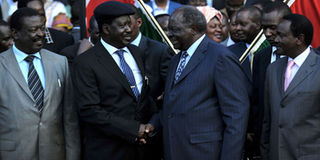The seven steps to a brave new Kenya

President Mwai Kibaki (2nd from right) and Prime Minister Raila Odinga (2nd from left) shake hands after their official announcement to the public of provisional results of Kenya's constitutional referendum in Nairobi August 5, 2010. Looking on are Vice President Kalonzo Musyoka (right) and deputy Prime Minister Musalia Mudavadi (left). AFP PHOTO/Tony KARUMBA
Work to start implementing the new constitution started on Thursday with civil service boss Francis Muthura convening a meeting.
Nearly 70 per cent of Kenyans, who voted in the August 4 referendum, endorsed the new law, according to provisional results.
Convened in the morning at the Office of the President, the meeting also prepared the ground for the address by President Kibaki, Prime Minister Raila Odinga and Vice-President Kalonzo Musyoka on the steps of the Kenyatta International Conference Centre Thursday afternoon.
The Commonwealth secretariat, which coordinates activities between the United Kingdom and a grouping of former British colonies, has sent experts to Nairobi to assess how the organisation could help. Mr Kamlesh Sharma, a representative of the Club’s secretary-general, met with Attorney General Amos Wako.
President Kibaki said a date when the new constitution will be promulgated, will be announced later. He has 14 days within which to sign the new constitution into law. He said: “I call on all to ensure the successful implementation of the new constitution”. He assured those opposed to sections of the new constitution that their views will be taken into account.
Mr Odinga said: “Change has finally come to our land. It has come because we refused to give up. It has come because finally, we agreed to work together.”
Mr Musyoka said: “This nation is entering the dawn of a fantastic new beginning and renewal.”
As the leaders and the public celebrated victory, the Attorney General’s office, the Ministry of Justice and Constitutional Affairs and the Office of the President were locked in meetings to ensure the smooth transition from the current constitution to the new dispensation.
The meetings focused on the next steps that have to be taken in line with the roadmap to a new constitution, which stipulate the events that have to take place from today until the new constitution becomes fully operational by 2012.
Mr Wako said that his office was scrutinising drafts of various laws that Parliament is meant to pass to pave way for the new constitution to come into force. Immediately after the President promulgates the new Constitution and gazettes it, the AG’s office and Parliament will ensure 49 Bills are passed.
Among the Bills to be passed are those on culture, land, consumer protection, ethics and anti-corruption, election disputes, vetting of judges and magistrates, support for county governments and election of the Speaker of county assemblies. “The Attorney General is very ready. I am very focused on the numerous legislations which are supposed to be enacted to bring into force the new constitution,” he said.
In addition, the AG is also assembling a team of drafters from his office, Parliament and the Kenya Law Reform Commission. This is because some of the laws are complicated and require the experience of drafters who have worked on similar Bills elsewhere.
As soon as counting is finished and the results officially declared, the Interim Independent Electoral Commission (IIEC) will immediately publish the new constitution in the Kenya Gazette.
The President will be the first to take a new oath of office in line with the new constitution, followed by Vice-President Kalonzo Musyoka, ministers, MPs, Speaker Kenneth Marende and deputy Speaker Farah Maalim.
Mr Odinga, who will take a fresh oath of office as the Lang’ata MP, will not be sworn in as the PM since the office was scrapped under the new constitution. However, he will continue to serve as PM until 2012. All Armed Forces chiefs, Police Commissioner Mathew Iteere, and all judges will also be required to take oaths.
Freshly sworn MPs
The freshly-sworn MPs will be required to pass the 49 Bills, which are necessary to bring into force the new set of laws.
Among the changes are a bicameral Parliament consisting of the National Assembly and Senate, 47 county governments established countrywide to manage local affairs, a Salaries and Remuneration Commission to determine salaries of all public servants and channelling of 15 per cent of all national revenue to counties.
Others include placing the Regular Police and Administration Police under one Inspector-General, appointments of ministers from outside Parliament, dual citizenship, a Supreme Court to hear presidential petitions and review Court of Appeal rulings, guaranteeing women one third of all leadership at national and county levels, and civil service, and an Equalisation Fund to address imbalances in marginalised areas.


